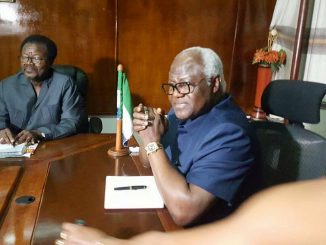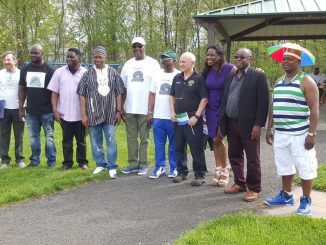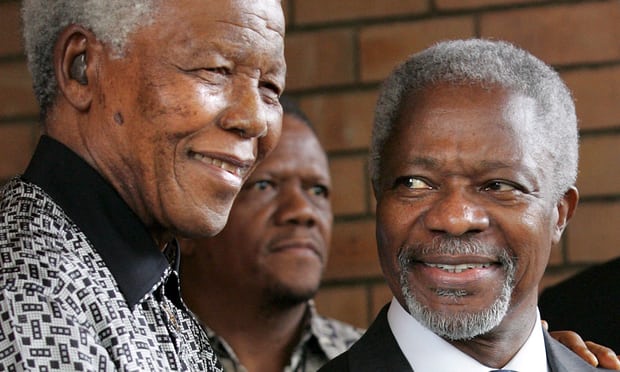
World leaders honour the former UN secretary-general, who has died aged 80, as a rare breed of diplomat
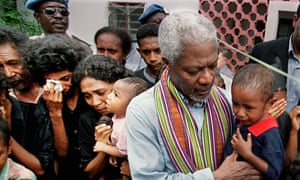
Tributes poured in from around the world for Kofi Annan, the first sub-Saharan African to lead the United Nations, whose work revitalising the organisation and putting human rights at the core of its mission was recognised with a Nobel peace prize.
In a rare moment of unity, leaders around the globe and across the spectrum, from Tony Blair to Vladimir Putin, remembered his charisma, commitment and diplomatic gifts.
In his home country, Ghana, president Nana Akufo-Addo said flags would fly at half-mast for a week in mourning to honour “one of our greatest compatriots”.
“He excelled in the various undertakings of his life, leaving in his trail most pleasant memories. His was a life well-lived,” Akufo-Addo said on Twitter.
Annan died aged 80 after a brief illness, with his wife and children by his side. “Wherever there was suffering or need, he reached out and touched many people with his deep compassion and empathy,” the Kofi AnnanFoundation said, confirming the death.
He spearheaded the global fight against HIV/Aids while in office and after leaving, and championed the millennium goals, the targets that became a focus for improving health and education worldwide.
South Africa’s Archbishop Desmond Tutu described his death as a “devastating loss”. Annan was an “outstanding human being who represented our continent and the world with enormous graciousness‚ integrity and distinction”, said Tutu.
He was admired but also much loved, said Frederic Eckhard, Annan’s spokesman and adviser for more than a decade, and the loss will be felt personally by many who worked with him. “You always felt on his team that you were working for something worthwhile.”
“Kofi had an interesting combination of traits, he was reserved and disciplined on the one hand, and on the other he could be kind of playful,” Eckhard said. “He handled things so calmly and with such assurance. He had an enormous amount of charm and terrific political instinct.”
Others paying tribute included Tony Blair, once an adversary over the Iraq war. Annan declared the US and UK-led attack illegal and described the UN’s inability to stop that conflict as his “darkest moment”.
The former British prime minister said: “He was a good friend whom I saw only weeks ago. Kofi Annan was a great diplomat, a true statesman and a wonderful colleague.”
Annan’s legacy is not entirely unblemished. As head of peacekeeping operations before leading the UN, he was in charge when genocide engulfed Rwanda and when thousands of Muslims were killed in the Srebrenica massacre in Bosnia.
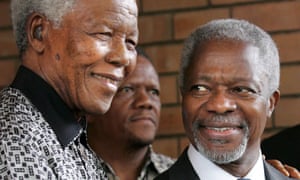
He was haunted by regret that the UN did not do more to stop these tragedies, which drove his later sense of mission. The painful memories “influenced much of my thinking, and many of my actions, as secretary-general”, he would say years later. He also made scathing internal UN reports public.
But after the cold war, Annan fought successfully to renew the UN’s sense of purpose, and carve out a role as a moral compass for a new world.
“Kofi Annan was a guiding force for good,” the current secretary-general Antonio Guterres said. “In many ways, [he] was the UN. He rose through the ranks to lead the organisation into the new millennium with matchless dignity and determination.”
Prime minister Theresa May said Annan helped make “the world he has left a better place than the one he was born into.” Opposition leader Jeremy Corbyn praised his work building a “more just and peaceful world”.
Annan’s last public mission was to Zimbabwe before bitterly contested elections. Opposition leader Nelson Chamisa praised him as, “a rare breed of diplomat; soft-spoken but unshakeably firm … Go well son of Africa, champion of the world!”
Russia’s Vladimir Putin praised his leadership skills. “I sincerely admired his wisdom and courage, his ability to make informed decisions even in the most complex, critical situations.”
Iran’s foreign minister Mohammad Javad Zarif shared a picture of him with Annan on Twitter, describing him as “a towering global leader and an unwavering champion for peace, justice and rule of law. Rest in peace my dear old friend.”
Eckhart remembered, overall, a leader who had focused on hope and optimism, for the world, and for himself.
“Early in the first term there was an editorial in a US paper that I thought was racist, and I brought it to his attention. I saw a rare glimpse of anger in his eye but then he said ‘that’s his [the writer’s] problem, not mine’. For me, that summed up his approach to problems and life.”
COURTESY–THE GUARDIAN

